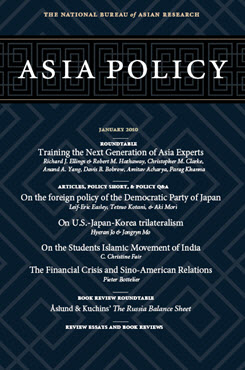Electing a New Japanese Security Policy?
Examining Foreign Policy Visions within the Democratic Party of Japan
To address uncertainties about the direction of Japanese security policy and its increasing connection with domestic politics, this article examines the foreign policy visions within the Democratic Party of Japan (DPJ).
EXECUTIVE SUMMARY
To address uncertainties about the direction of Japanese security policy and its increasing connection with domestic politics, this article examines the foreign policy visions within the Democratic Party of Japan (DPJ).
MAIN ARGUMENT
There are five main tenets of the DPJ’s envisioned “independent diplomacy”:
- pursuing a more “mature” alliance in which Japan is less dependent on and deferential to the U.S.
- re-establishing Japan as a “member of Asia” through economic and trade initiatives, historical reconciliation, and multilateral institution-building
- contributing to international security through the UN, with Japan providing financing, peacekeepers, and impetus for reform
- working for nuclear disarmament via international, regional, and bilateral diplomatic efforts
- modernizing Japan’s national security apparatus to prioritize citizen rights and taxpayer savings
POLICY IMPLICATIONS
- Drastic changes to Japanese foreign policy are unlikely as the DPJ faces the practical realities of governing and looks to prove itself before Upper House elections in 2010.
- Despite the challenges of stabilizing Afghanistan and Iraq, combating piracy, and searching North Korean vessels, the political bar for international operations by Japan’s Self-Defense Forces (JSDF) will likely rise.
- A DPJ government will maintain the U.S. alliance but may scale back the Liberal Democratic Party’s (LDP) goal of a global security partnership by limiting the scope of the alliance to Japan’s defense and regional stability.
- In the process of differentiating the DPJ from the LDP and taking political advantage of the unpopularity of Bush administration foreign policies, the DPJ made promises to the Japanese public. A DPJ government would likely address at least some of those promises so as not to lose credibility.
- In particular, the DPJ may seek to modify plans for alliance transformation, thereby opening up contentious debates about roles and missions, financial support, basing, and relocation of U.S. marines from Okinawa to Guam.
About Asia Policy
Asia Policy is a peer-reviewed scholarly journal presenting policy-relevant academic research on the Asia-Pacific that draws clear and concise conclusions useful to today’s policymakers. Asia Policy is published quarterly in January, April, July, and October and accepts submissions on a rolling basis. Learn more


